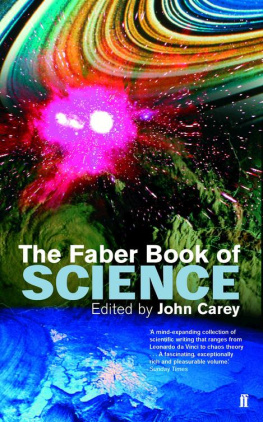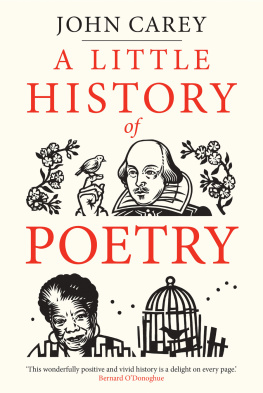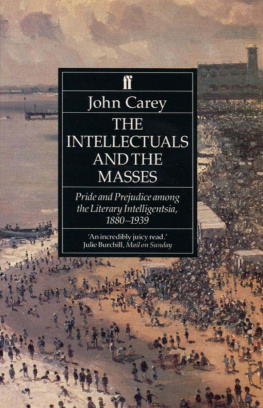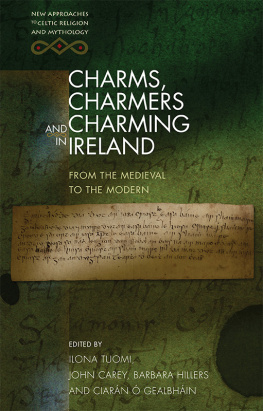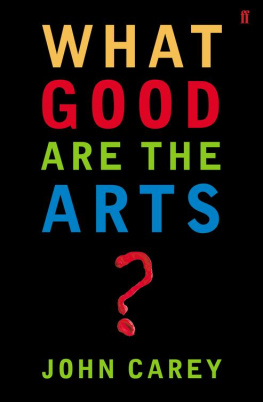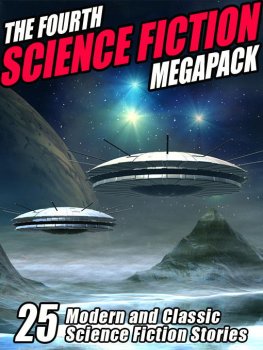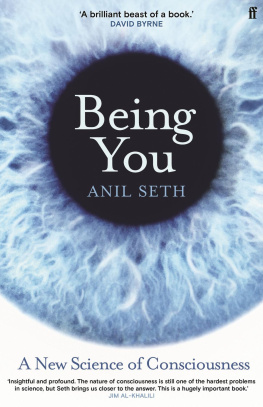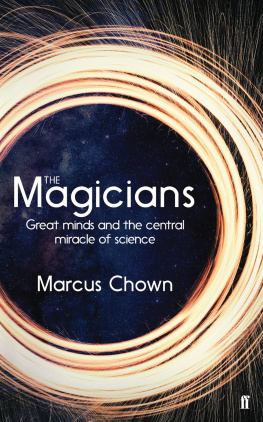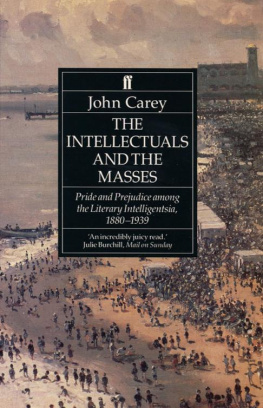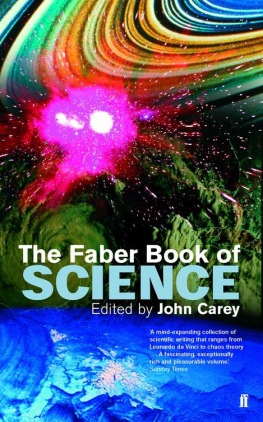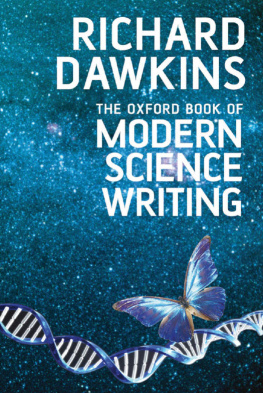As a book to pick up and dip into from time to time, this will be a compelling volume to artists and scientists alike. NewScientist
Professor Careys anthology had me gripped The fruit of wide reading and impressive understanding. SundayTelegraph
This is a delightful, enchanting book the erudition of ages garlanded by Careys dry wit and infectious enthusiasm. MailonSunday
A series of fascinating essays in such diverse subjects as malaria, the first electric light bulbs, early photographs and Charles Lyells shocking revelations on the shifting of rocks. A must for all those, like me, who long to be educated, and fast. Beryl Bainbridge, Books of the Year, Independent
A big, beautiful, desirable book, including marvels like Ruskin in praise of the russet velvet of rust, or Nabokov waiting among the darkening lilacs to spot the vibrational halo of an olive and pink Hummingbird moth. DailyTelegraph
The aim of this book is to make science intelligible to non-scientists. Of course, like any anthology, it is meant to be entertaining, intriguing, lendable-to-friends and good-to-read as well, and the first question I asked about any piece I thought of including was, Is this so well written that I want to read it twice? If the answer was no, it was instantly scrapped. But alongside this question I asked, Does this supply, as it goes along, the scientific knowledge you need to understand it? Will it be clear to someone who is not mathematical, and has no extensive scientific education? Even if it was admirable in other ways, failure to qualify on these counts landed it on the reject pile.
Scientists themselves are not always good at judging intelligibility and why should they be? They are specialists, paid to communicate with fellow specialists. Of course, they have to communicate, too, with industry, the government, grant-giving bodies and other institutions. But they can often assume a level of expertise in these negotiations which is well above that of the general public. Over the last five years I have read many books and articles by scientists, ostensibly for a popular readership, which start out intelligibly and fairly soon hit a quagmire of equations or a thicket of fuse-blowing technicalities, from which no non-scientist could emerge intact. Relativity:TheSpecialandGeneralTheory.APopularExposition, by Albert Einstein, Ph.D. (1920) is only a particularly distinguished example of a class of popular expositions, still being published, that could not conceivably be understood by more than a tiny fraction of any populace.
Fortunately for this anthology, however, popular science has improved immensely in the later twentieth century. Writers like Isaac Asimov, Arthur C. Clarke, Martin Gardner, Freeman Dyson, Carl Sagan, Richard Feynman, Stephen Jay Gould, Peter Medawar, Stephen Hawking, Lewis Wolpert and Richard Dawkins have transformed the genre, combining expert knowledge with an urge to be understood, and bridging the intelligibility gap to delight and instruct huge readerships. In the process, they have created a new kind of late twentieth-century literature, which demands to be recognized as a separate genre, distinct from the old literary forms, and conveying pleasures and triumphs quite distinct from theirs.
True, these writers had predecessors in the nineteenth century T. H. Huxley, for example, or Charles Darwin himself, who also strove to reach the general reading public. But in the mid-nineteenth century the general reading public was a much smaller and more select thing than it is now. The challenge for a late twentieth-century writer of popular science is different and greater. The books that succeed represent achievements of a remarkable and unprecedented kind. Nor is it clear on what grounds they can be reckoned inferior to novels, poems and other representatives of the older genres. In what respect, for example, is a masterpiece like Richard Dawkinss TheBlindWatchmaker imaginatively inferior to a distinguished work of fiction such as Martin Amiss EinsteinsMonsters (or the hundreds of lesser novels that jam the publishers lists each year)? Both are clearly the products of brilliant minds; both are highly imaginative; and Amis is more excited by scientific ideas than most contemporary writers. Nevertheless, the essential distinction between them seems to be that between knowledge and ignorance. From the viewpoint of late twentieth-century thought, Dawkinss book represents the instructed and Amiss the uninstructed imagination.
Because I wanted the pieces I included to be seriously informative as well as enjoyable, I decided not to allow in science fiction (which would, in any case, need an anthology of its own), or those plentiful anecdotes about scientists private lives which show how droll or winning they were despite their erudition. The misty precursors of true science alchemy, astrology have also been left out, partly because they can now be classified as history not science, and partly because they tend to encourage in the reader an amused and superior response which is not the reaction I am looking for.
For similar reasons I decided, after some hesitation, not to include ancient science (Aristotle, Pliny, etc.). It is true, of course, that this sometimes foreshadows modern science. But even when it does it is often forbiddingly technical, in a way that no amount of jazzing-up in translation can overcome. After a good deal of searching, I concluded that there were virtually no examples of ancient science that would have anything more than curiosity value if that for a general reader today. So my anthology starts with the Renaissance, at a point where two sciences, anatomy and astronomy, take decisive steps towards the modern age, and find exponents who can still be read with pleasure.
A final kind of writing I decided (rather quickly) to exclude was the large body of opinionativeness that has gathered around such questions as whether science is a Good or a Bad Thing, and whether we would be better off if we did not know the earth went round the sun. Ignorance and prejudice seem to be the most prolific contributors to this branch of controversy, and I am not anxious to give either house-room.
In the main, then, I have tried to stick to serious science, though serious science softened up for general consumption. Scientists will object quite rightly that I have included technology as well as science. The pieces on the Wright brothers aeroplane or on Daguerre and the first photograph, for example, would not figure in a strictly scientific anthology. But I included them and others because, for the general reader, science and technology are intimately connected as, indeed, they are for scientists. Photography and manned flight both became possible because of scientific perceptions, and technology has advanced scientific discovery from the time of Galileos telescope.
Choosing the passages to include was one thing: arranging them, another. Should I separate out the various sciences all the biology pieces in one section; all the chemistry in another? Or would a roughly chronological arrangement be better? I decided it would, because jumping from science to science with each item makes for a livelier read, and the chronological framework turns the book into a story a way of taking in the development of science over the last five centuries. Some of this story-telling is carried on in the introductions to each extract, and sometimes as, for example, in the sections on Relativity and the Uncertainty Principle I have drawn together material from several sources, including poets and novelists, to show how a particular scientific discovery did, or did not, enter the bloodstream of the culture.

